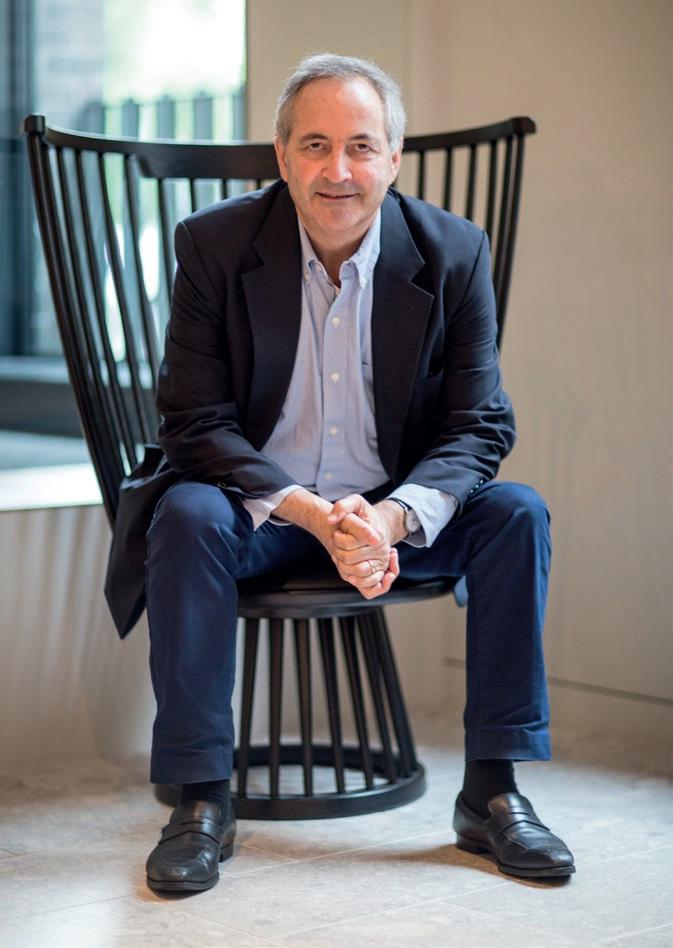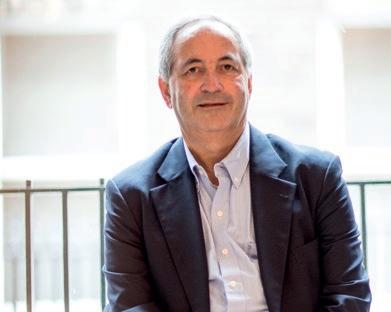
4 minute read
The Art of Future-gazing
from Aston in Touch 2017
by Aston Alumni

Photograph: Helen Atkinson / Yellow Snapper
In 1900 John Elfreth Watkins predicted that by the Millennium we would have removed the letters C, X and Q from the alphabet. Reader’s Digest thought that by 1999 cities would have domes over them and our transport would be “flying-saucer-shaped”. In 1991 David Icke called a press conference to tell reporters that the world would end in 1997. Predictions like these certainly add to the gaiety of nations but, as Daniel Franklin points out, predicting is also part of being human. Whether we realise it or not, we’re all engaged in it - whether it’s checking the weather forecast or anticipating events in our diaries. Predictions are, in fact, essential for successful living.
Advertisement
As Executive Editor of The Economist and Editor (since 2003) of The Economist’s annual publication The World in…, Franklin spends a great deal of time trying to predict global trends: work that he calls, with characteristic self-effacement, “future-gazing”. He would never claim to be a prophet, despite the cult amongst some readers for de-coding the ‘secret messages’ hidden in The World in… covers. In March 2012 the book he edited on long-term trends, Megachange: The World in 2050, came out with a typically Franklin-esque warning in the introduction.
“History is littered with prophecies that turned out to be utterly wrong,” he wrote, before reminding us of a forecast from an American economist that the stock market would rise - a week before the 1929 crash.
“You probably need a lot of luck,” he says of the qualities of a good forecaster. “Of course, everybody will get things wrong so you need humility as well. I think also you need to be open-minded and be prepared to take on board new information from a whole range of sources. So long as you don’t make puffed-up claims about how much you’re going to get right I think people are prepared to forgive you if you get it wrong - but they want you to try.”
Franklin’s career has certainly embraced wide-ranging topics, starting with a degree in modern languages (French and Russian) from St John’s College, Oxford, and a PhD from Aston. At Aston he took part in a scheme called Interdisciplinary Higher Degrees which allowed students to combine academic work with industry experience. Franklin worked at a subsidiary of Dunlop, which helped him to form a case study for his research on the trade of centrally planned economies. “That’s still what stands out for me about Aston, this close connection between working experience interspersed with academic study,” he remarks. “I think the principle is a very Astonian one and something that I still admire about Aston, even though Interdisciplinary Higher Degrees no longer exist.” Franklin joined The Economist in 1983 to write about Soviet and Eastern European affairs, becoming the magazine’s Europe Editor from 1986 to 1992. After a stint as Britain Editor he moved to the United States as Washington Bureau Chief, covering the first Clinton term. In 1997 he returned to London as Editorial Director of the Economist Intelligence Unit. From 2006 to 2010 he was Editor-in-Chief of Economist.com.

The future-gazing, explains Franklin, is one of the most fun things about his current role. Has it changed him? What have been the major surprises? “Well, I’m by nature more of an optimist than a pessimist but often a realist, too. Every year I go through this humbling process of looking back over what we did the year before. I think it’s the big disruptions that are the hardest things to get right because you may think a crisis is coming but getting the timing right is very difficult. The election of Trump is the one that I think surprised the world the most.” The cover of The World in 2017, which coincided with the result, has the caption ‘Planet Trump’ and shows a deck of Tarot cards from the Major Arcana - known as ‘trumps’ (Franklin is silent on whether or not this was done to excite the de-coders but there is a twinkle in his eye). One humbling process, he says, was looking back after the economic crisis at The World in 2008 - an experience he wrote about in the following edition of the magazine in an article titled simply “About 2008: sorry”.
This is typical of Franklin’s genial style - as is the fact that the planning process of each edition of The World in… begins in stoutly British fashion: with an editorial tea. “This year the tea was particularly good so I’m optimistic about 2018,” he laughs. At the time of writing the work on this edition is at an early stage but Franklin gives us some hints of what we might expect in The World in 2018 when it’s published in November.
“We have a World Cup in Russia and that’s going to be a focus of tension because Russia also has a presidential election. Amazingly enough, it’ll be time to pass a preliminary judgement on the Trump administration - mid-term elections are in November 2018 - and there are a huge amount of elections in Latin America, so that’s the region that has the most intense political year ahead. The end of the Castro era in Cuba is fascinating. There are some big anniversaries: 100 years since the Armistice; 200 years since the birth of Karl Marx. You think of ‘workers of the world unite’ but it will also be 15 years since Linkedin was formed, so that’s another form of workers uniting. It will be the centenary of women getting the vote in Britain and 175 years of The Economist - we have our own anniversary next year.
“I suppose the word of the year might be supercalifragilisticexpialidocious because the film Mary Poppins Returns, with Emily Blunt, comes out towards the end of next year. But if you want to look at themes, I’m pretty sure we’ll be delving into the political debate between what you might call the Trump trend and the Macron momentum, looking at closed and open ideas of the world, and which one is likely to get the upper hand in 2018.”
Lots to excite the mind, then, but some advice from Benjamin Franklin - another Franklin known for his optimistic realism - still holds good on the subject of futuregazing. “Do not anticipate trouble,” he warned, “or worry about what may never happen. Always keep in the sunlight.”




